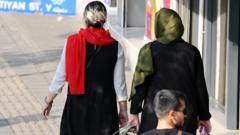A United Nations report finds that Iran is utilizing drones and digital applications to enforce strict hijab laws, with the state's "vigilantism" encouraging citizens to report violations. The consequences for noncompliance can be extreme, including imprisonment and abuse.
Iran Implements High-Tech Surveillance to Enforce Hijab Laws

Iran Implements High-Tech Surveillance to Enforce Hijab Laws
The UN reports increasing use of drones and apps by Iranian authorities to monitor women's compliance with dress codes, leading to severe repercussions for dissenters.
Iran is ramping up its enforcement of strict dress codes for women by deploying advanced surveillance technology, including drones and mobile applications, according to a recently released United Nations report. This initiative, framed by officials as promoting civic responsibility, targets women who defy the mandated hijab laws, with serious penalties in store for offenders.
Authorities in Iran have been accused of utilizing a strategy dubbed "state-sponsored vigilantism" to incentivize the public to report individuals, particularly women, who are alleged to violate the dress code, especially in transportation contexts like taxis and ambulances. The crackdown follows the tragic death of Mahsa Amini, a young Kurdish woman arrested for her headscarf violation in 2022, which triggered widespread protests against the Islamic regime's policies.
As highlighted in the report compiled by the Independent International Fact-Finding Mission, Iranian officials are increasingly relying on surveillance tools, such as facial recognition technology installed at university entrances and security cameras on major roadways, to monitor compliance with hijab regulations.
The "Nazer" mobile application, introduced by Iranian police, allows users to report women for hijab infractions. Information such as vehicle license plates and locations can be documented by app users, alerting authorities to potential violations, which results in warnings and possible vehicle impoundment directed at their owners.
The report sheds light on the ongoing discrimination against women, who face systematic abuse and violence, with investigators interviewing nearly 300 victims. It also emphasized the lack of independence within Iran's judiciary system, which fails to protect victims of torture or sexual violence in custody—as detailed in several harrowing testimonies from women who spoke of severe mistreatment.
The findings are set to be discussed at the Human Rights Council meeting on March 18, as the global community continues to watch the escalating situation in Iran, where women's rights remain critically compromised.





















